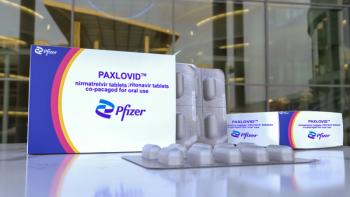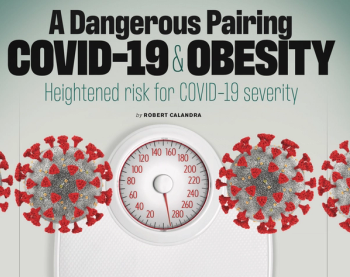
Epic research suggests that like COVID-19, flu and other viral pneumonias can result in long-term symptoms like fatigue and brain fog. Why that might be is an open question.


Epic research suggests that like COVID-19, flu and other viral pneumonias can result in long-term symptoms like fatigue and brain fog. Why that might be is an open question.

A review of multiple studies found the COVID-19 exacerbated the economic, social and psychological difficulties that patients with cancer were already facing because of their cancer.

Mayo Clinic researchers reported today in the journal Clinical Infectious Diseases that less than 1% of patients at high risk for experiencing severe COVID-19 who were treated with Paxlovid (nirmatrelvir and ritonavir) experienced a second bout of COVID-19.

University of Maryland researchers calculate difference in COVID-19 mortality rates in counties depending on popular vote in the 2020 presidential election.

One in 4 COVID-19 patients in the 18-64 age group experienced at least one of the 26 conditions that may be associated with COVID-19, according to CDC researchers. However, the study did not differentiate the risk by vaccination status or SARS-CoV-2 strain, both of which may affect the risk of post-acute conditions and symptoms.

Research suggests that COVID-19 vaccination may serve a therapeutic effect, possibly reducing the risk of developing long COVID when administered to those currently infected.

The partnership will allow international manufacturers to use the technologies for the potential development of COVID-19 vaccines, treatments and diagnostics to benefit people living in low- and middle-income countries.

It is a statistical model not actual data. But calculations by Brown University School of Public Health and Microsoft researchers show that 318,000 of the 641,305 deaths from COVID-19 between Jan. 1, 2021, and April 30, 2022, might have been prevented if vaccination coverage among U.S. adults had reached 100%.

Findings reported in this month’s Health Affairs show high use of telehealth in disadvantaged neighborhoods among beneficiaries after Medicare restrictions on telehealth were waived.

The U.S. Food and Drug Administration expanded the approval of the COVID-19 treatment Veklury (remdesivir) today to include pediatric patients 28 days of age and older.

As of early this year, as many as 23 million Americans may have developed long COVID, in which symptoms persist four or more weeks after first being infected with the virus. The condition is likely to have additional long-term effects that are not yet clear. However, the U.S. has begun to obtain a glimpse of long COVID’s far-reaching impact on those who suffer from it - and the picture is rather disturbing.

Findings published in the April issue of Health Affairs show a huge jump in telehealth visits, but the researchers also detected that a pattern that suggests that people with conditions such as schizophrenia did not make the switch to telehealth as readily as people with anxiety and some other disorders.

“The most remarkable change in patterns of health during the (past) century has been the largely successful conquest of infectious diseases,” wrote Allan Brandt, Harvard medical historian, in “No Magic Bullet: A Social History of Venereal Disease in the United States Since 1880."

COVID-19 and overdoses were the main reasons 2021 was the deadliest year in U.S. history.

William Dietz, MD, PhD, Professor and Director of Sumner M. Redstone Global Center for Prevention and Wellness at George Washington University, addressed to MHE the degree obesity is a risk factor at for severe COVID-19 and what those reasons are for obesity increasing the risk. This video is in correlation to Managed Healthcare Executive's March Issue cover story highlighting the dangerous pairing of COVID-19 and Obesity.

Aaron Glatt, MD, Chairman of the Department of Medicine and Chief of Infectious Diseases/Hospital Epidemiologist at Mount Sinai South Nassau and Clinical Professor of Medicine at the Icahn School of Medicine at Mount Sinai, addressed to MHE the degree obesity is a risk factor at for severe COVID-19 and what those reasons are for obesity increasing the risk. This video is in correlation to Managed Healthcare Executive's March Issue cover story highlighting the dangerous pairing of COVID-19 and Obesity.

Their application to the FDA included data showing that confirmed infections and severe illness were lower among individuals who received a second booster of the Pfizer-BioNTech vaccine.

Saunders, co-founder at Intellihealth and assistant professor of Clinical Medicine at Weill Cornell Medical College, addressed to MHE the degree obesity is a risk factor at for severe COVID-19 and what those reasons are for obesity increasing the risk. This video is in correlation to Managed Healthcare Executive's March Issue cover story highlighting the dangerous pairing of COVID-19 and Obesity.


For now, only the Pfizer and Moderna vaccines have full FDA approval, but many candidates are in phase 2 or 3 trials.

With the COVID-19 pandemic ongoing and alarming levels of healthcare workers still experiencing stress, burnout, and other negative feelings surrounding their work, it's time to return the favors they've given countless others.

During the state of the industry webinar, AHIP experts reviewed policies and solutions to improve affordable access to care and shape healthcare in the post-pandemic world.

An analysis cites increases in bloodstream and urinary tract infections. Hospitals and skilled nursing facilities are seeing more problems.

Recent treatment may affect the antibody response, particularly among those with hematologic cancers.

“Long COVID” is more likely to affect older people and those who have been hospitalized, but younger people with milder symptoms are not immune to lingering symptoms. One plausible explanation is that the infection results in the activation of autoantibodies.